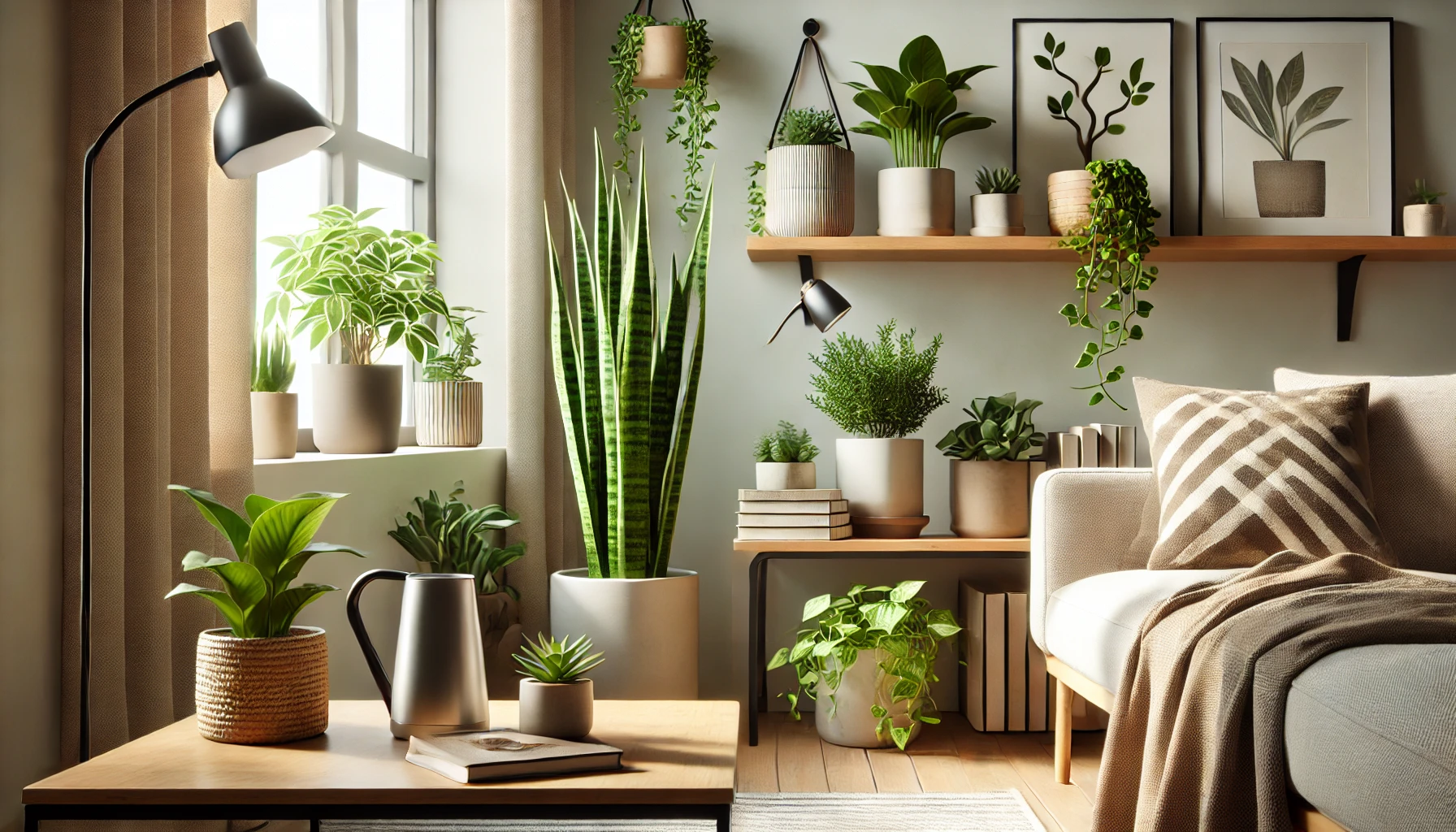Indoor gardening doesn’t have to be time-consuming. By choosing the right plants, tools, and techniques, you can create a thriving indoor garden that requires minimal effort to maintain. This guide will walk you through setting up and caring for a low-maintenance indoor garden that fits perfectly into your busy lifestyle.
Benefits of a Low-Maintenance Indoor Garden
- Improves Air Quality: Plants filter toxins and release oxygen, creating a healthier indoor environment.
- Reduces Stress: Greenery adds a calming ambiance to your space.
- Minimal Effort: With the right setup, an indoor garden can flourish with minimal care.
- Enhances Aesthetic Appeal: Adds beauty and life to your home without requiring a green thumb.
Choosing Low-Maintenance Plants
1. Succulents and Cacti
- Require infrequent watering and thrive in bright, indirect light.
- Examples: Jade plant, echeveria, aloe vera.
2. Snake Plant (Sansevieria)
- Hardy and adaptable to various light conditions.
- Needs watering only every few weeks.
3. Pothos (Epipremnum aureum)
- Fast-growing, forgiving, and purifies the air.
- Tolerates low light and irregular watering.
4. ZZ Plant (Zamioculcas zamiifolia)
- Drought-tolerant and thrives in low-light conditions.
- Ideal for forgetful plant owners.
5. Peace Lily (Spathiphyllum)
- Elegant appearance and low water needs.
- Prefers medium to low light.
6. Spider Plant (Chlorophytum comosum)
- Easy to care for and produces “babies” for propagation.
- Tolerates various lighting conditions.
Setting Up Your Indoor Garden
1. Choose the Right Location
- Select a spot with adequate natural light or use grow lights for low-light areas.
- Avoid placing plants near air vents or drafts.
2. Use Appropriate Containers
- Opt for pots with drainage holes to prevent overwatering.
- Choose stylish containers that complement your home décor.
3. Use the Right Soil
- Use well-draining potting soil to avoid waterlogging.
- For succulents and cacti, use a mix specifically designed for these plants.
4. Group Plants with Similar Needs
- Keep plants with similar water and light requirements together to simplify care.
5. Incorporate Self-Watering Pots
- Self-watering pots reduce the need for frequent watering and ensure consistent moisture levels.
Caring for a Low-Maintenance Indoor Garden
1. Water Sparingly
- Overwatering is the most common cause of plant issues. Allow the topsoil to dry out before watering.
- Succulents and cacti need watering only once every 2-3 weeks.
2. Provide Consistent Light
- Rotate plants occasionally to ensure even growth.
- Use full-spectrum grow lights for low-light spaces.
3. Fertilize Occasionally
- Feed plants during the growing season (spring and summer) with a diluted, balanced fertilizer.
- Skip fertilizing in the fall and winter.
4. Clean Leaves Regularly
- Dust can block light absorption, so wipe leaves with a damp cloth to keep them clean.
5. Prune Dead or Yellowing Leaves
- Regularly remove dead foliage to maintain a tidy appearance and encourage new growth.
Creative Ideas for a Low-Maintenance Indoor Garden
1. Vertical Gardens
- Use wall-mounted planters to save space and create a striking display.
- Perfect for trailing plants like pothos or ivy.
2. Terrariums
- Self-contained ecosystems that require minimal watering.
- Use succulents or air plants for a stunning arrangement.
3. Hanging Baskets
- Add greenery without taking up floor space.
- Choose trailing plants like string of pearls or spider plants.
4. Grouped Arrangements
- Combine different plants in varying heights and textures for a visually appealing centerpiece.
Troubleshooting Common Issues
- Overwatering: Check soil moisture before watering. Use pots with drainage holes.
- Leggy Growth: Ensure plants get sufficient light by moving them closer to a window or adding grow lights.
- Yellow Leaves: Often caused by overwatering or poor drainage. Adjust care as needed.
- Pests: Inspect plants regularly and treat infestations with neem oil or insecticidal soap.
Conclusion
A low-maintenance indoor garden is a perfect way to enjoy the beauty and benefits of plants without a significant time commitment. By selecting resilient plants, using the right tools, and following simple care practices, you can create a thriving garden that complements your home and lifestyle.
